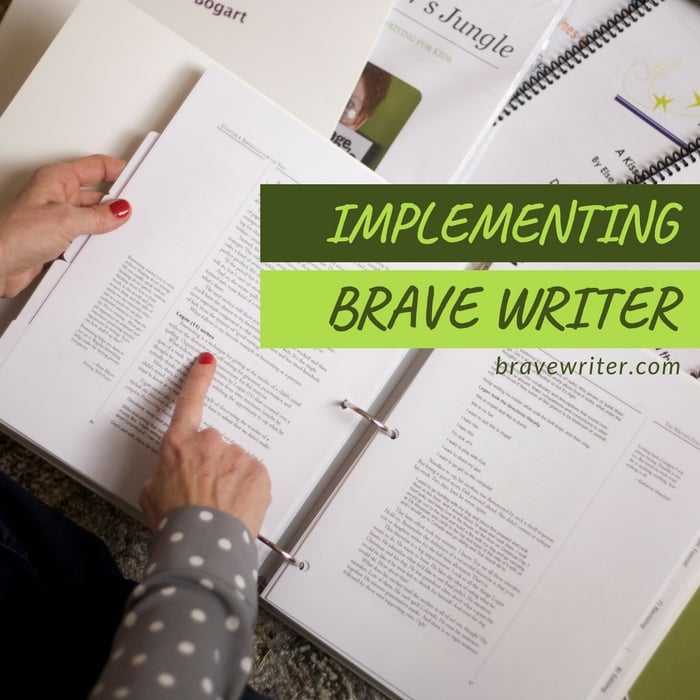Implementing Brave Writer in Your Homeschool
The goal of The Writer’s Jungle:
- Read a chapter.
- Do what’s in it.
Allow yourself to actually take the time to do the processes. Don’t hurry ahead. Trust that the process IS teaching. You want your kids to slowly build the ability to tune in to themselves and hook up the hand with the brain.
Each chapter in The Writer’s Jungle gives you something to do. Don’t run ahead. Focus on one chapter at a time. Skip the Preface (it is meant to be additional material that we added in 2005). Save it for later. Start with the core chapters (and Chapter 14 provides a nice overview).
For the Arrow—the process goes like this:
- Read the book aloud.
- Go at any pace that works for you.
Then each week, look at the passage for the week. Read it together. You can read it from The Arrow or in the book itself. You can read the notes I give you ahead of time and discuss them with your child in your own voice, or you can read them aloud. Whatever feels right to you. You don’t HAVE to cover every item in the notes. They are meant to slowly train YOU to see literary devices, grammar and spelling opportunities, punctuation and more.
You can zero in on one or two or all of them depending on your child. Discuss a little. Look at the passage and say (for instance): “Who sees periods?” They will point them out. Then ask, “Any other end marks?” They point to an exclamation point and a question mark. Ask: “How do they change how you read the sentences?” Then have them try reading the sentences in a row each one with a slightly different emphasis. Then use the notes to help you explain. Like that.
Next, your child will handwrite (copy) the passage—it might take all week, it might take a day. You can choose to then use the same passage for dictation or one of the other two methods on a day of your choosing. Read the Guidelines to get some insight into how to do that.
The WHOLE goal in the Arrow is to give you tools to help you bring the passage to life and to see it for its mechanics and literary value—while using copywork and dictation practices.
The Literary Element each month can be read and discussed and then experienced with the Writing Activity of the month (which should take about half a day). You aren’t going for some kind of mastery as much as conversational exposure and repetition until your kids SEE them themselves in writing and then eventually TRY them in their own writing.
Try not to overthink this. It is meant to be easy for you!
Think of it more like this: we are giving you notes (things to consider as you read). You don’t even have to master them yourself. Just consider. For instance, in The Green Ember we talk about affixes. You certainly don’t even need to use the name “affix” unless you want to. But what it you simply go back to the Week One passage and find any word that seems to have a little extra bit on it? The “un,” the “ly,” the “in” are all given to you to find. Look at the words. Think about them. Discuss how words are “built” like Lego. Like that.
Our goal is to give you things to look at, to talk about, to consider. Try to move away from “mastery” and “getting things done.” Allow the notes to give you pause and create moments of inquiry. Yes, you may not actually know these terms or categories! It’s like when I realized I didn’t understand multiplication or couldn’t remember how to divide fractions.
Take the time to think about the concepts so that YOU have a moment of transformation. If it feels like too much, just do that for one passage in a month. Let THAT be enough depth and simply copy the other passages. Like that.
Grow over time, allow the tools to be your guide, not your task-master.



















